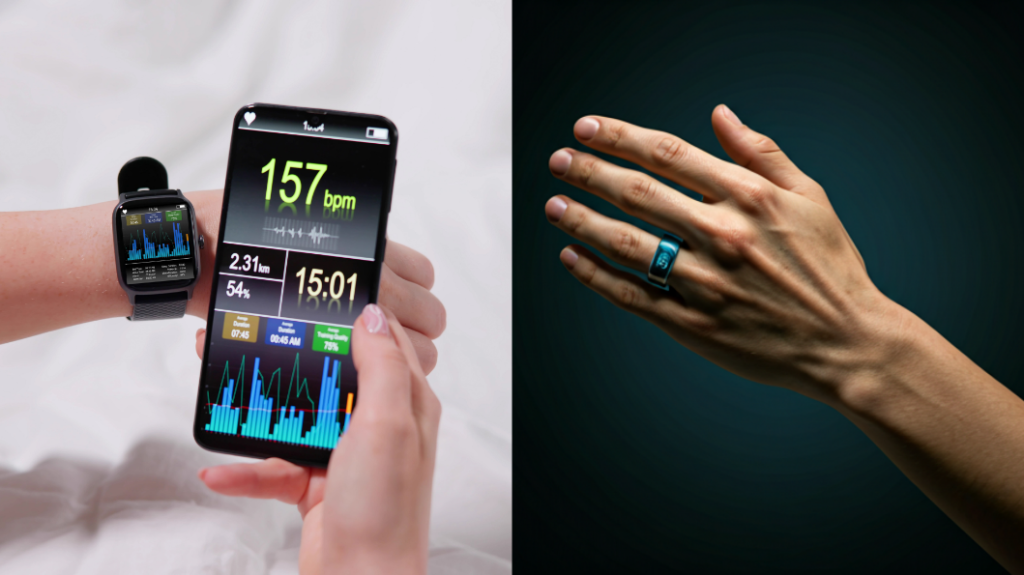Wearable health devices, such as smartwatches and smart rings, are transforming the landscape of chronic disease management in 2025. These gadgets empower individuals to monitor key aspects of their health, identify potential issues early, and make meaningful lifestyle changes to prevent or manage chronic conditions.
Helping You Stay Ahead of Health Issues
Modern smartwatches and smart rings, equipped with advanced sensors, can assist in spotting early signs of chronic conditions such as high blood pressure, diabetes, or heart issues 1. With real-time feedback, they empower users to make timely changes, such as staying active, managing stress level, or scheduling a visit to the doctor.
As you age, staying on top of your health becomes even more crucial. These smart devices can help you to:
- Support Better Heart Health: Measure heart rate, monitor blood pressure, and detect irregular heart rhythms early, enabling you to consult a doctor before symptoms escalate.
- Encourage Consistent Movement: Set step goals and receive gentle reminders to move throughout the day, helping lower the risks of conditions like arthritis or obesity, while maintaining a healthy lifestyle.
- Monitor Stress and Sleep: Track sleep patterns and identify signs of conditions like sleep apnea to improve rest and recovery. Better sleep and stress management can boost energy levels and help prevent chronic illnesses like high blood pressure or diabetes.
In addition to detecting health issues, wearables bridge the gap between you and your doctor. By sharing real-time health data, these devices allow your healthcare provider to tailor advice and treatment plans specifically for you. Personalized care combined with actionable insights ensures you are actively improving your well-being, giving you more control over your health as you age.
Differences Between Smartwatches and Smart Rings

Smartwatches and smart rings are both effective tools for health monitoring, but they differ in design, functionality, and use cases:
- Design and Wearability:
- Smartwatches: Larger and worn on the wrist, smartwatches double as fitness trackers and digital assistants, with features like call notifications, GPS, and apps.
- Smart Rings: Smaller and discreet, smart rings are worn on a finger and focus more on health tracking, such as sleep, stress levels, and activity.
- Health Features:
- Smartwatches: Offer a broader range of features, including electrocardiogram (ECG) monitoring, heart rate tracking, blood oxygen levels, and even integration with continuous glucose monitors.
- Smart Rings: Focus on specific metrics like heart rate variability (HRV), oxygen saturation, and sleep quality, often using advanced sensors in a more compact form.
- Battery Life:
- Smartwatches: Typically require frequent charging, lasting 1–2 days on average.
- Smart Rings: Often have better battery life, lasting up to a week due to their minimalist design and focus.
- User Experience:
- Smartwatches: Offer more interactive features with screens for notifications, apps, and activity tracking.
- Smart Rings: Provide a non-intrusive option for those who prefer less visible devices.
Ultimately, the choice between a smartwatch and a smart ring depends on your lifestyle and health goals. Smartwatches suit users seeking multifunctionality, while smart rings appeal to those prioritizing simplicity and discretion.
Considerations
While these devices are helpful, it is important to consider a few things:
· Accuracy: While improving, wearables may not replace professional medical equipment. Use the data as a guide, not a diagnosis.
· Data security: Ensure your device encrypts data to protect your privacy.
· Cost: Some advanced features can be pricey. Programmes like HPB’s initiatives help make basic trackers affordable or free.
A Future of Personalized Health
Wearable devices are only getting smarter. New developments in artificial intelligence will help these tools predict health risks even earlier, providing personalized insights and recommendations. Imagine a device that not only tracks your blood pressure but suggests specific actions, like a short walk or breathing exercise, to bring it under control.
By integrating wearable technology into daily life, individuals can take greater control of their health, delay the onset of chronic conditions, and improve overall well-being.

How to Get Started?
If you are interested in integrating wearable technology into your health journey, here are some easy ways to begin:
- HealthTrack SG: This new pilot initiative from HPB collaborates with Google, ConnectedLife and Fullerton Health to deliver real-time health feedback and personalised recommendations. It is designed to help at-risk individuals and those with chronic conditions manage their health more effectively. Register your interest for HealthTrack SG here: https://bit.ly/4gKK27H
- Fitness Trackers and Smartwatches: Start with basic devices to track your daily steps, sleep quality, and heart rate. In Singapore, the National Steps Challenge by the HPB offers free fitness trackers to Singaporeans and PRs. This program motivates participants to stay active by offering rewards for achieving daily step goals, making it a fun and accessible way to improve your health.
Whether you are taking your first steps toward better health or looking for tools to manage chronic conditions, wearable devices combined with these programs provide practical and tailored support.
References
1. Ballinger, B., Hsieh, J., Singh, A., et al. (2018) ‘DeepHeart: Semi-supervised sequence learning for cardiovascular risk prediction’, Available at: https://arxiv.org/abs/1802.02511 (Accessed: 19 December 2024)
2. Jafleh, E.A., Alnaqbi, F.A., Almaeeni, H.A., et al. (2024) ‘The Role of Wearable Devices in Chronic Disease Monitoring and Patient Care: A Comprehensive Review’, Cureus, 16(9), p. e68921. Available at: https://doi.org/10.7759/cureus.68921 (Accessed: 19 December 2024)
3. Health Promotion Board (2024). Health Promotion Board collaborates with technology and healthcare partners to incubate solutions that will help Singaporeans prevent and manage chronic conditions. Health Promotion Board. Available at: https://www.hpb.gov.sg/newsroom/article/health-promotion-board-collaborates-with-technology-and-healthcare-partners-to-incubate-solutions-that-will-help-singaporeans-prevent-and-manage-chronic-conditions (Accessed: 19 December 2024)




















